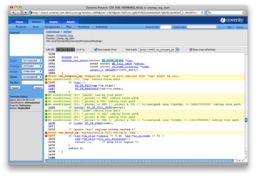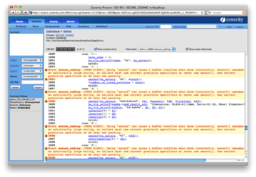Code Cleanup
The BRL-CAD source code is large with a lot of history. In order to survive decades of development, considerable time and attention is put forth towards improving code maintainability and code quality. One of the best ways to get involved in BRL-CAD open source development is to help clean up source code.
Cleaning up the source code helps you become familiarized with BRL-CAD and improves maintainability. There are a variety of ways you can clean up source code, but some of our specific efforts in place to help refactor BRL-CAD are:
Contents
The HACKING File
Our tried and true developer guidelines HACKING file identifies numerous stylistic concerns and source code conventions that the entire BRL-CAD source code should conform to. When in doubt, consult the dev guidelines.
Strict Compilation
This code cleanup effort is now considered complete and is enforced by default. One excellent and easy way to improve code quality, maintainability, and consistency is to pay attention to compilation warnings. Sure, the compiler sometimes gets things wrong, but even the "false positives" that get reported tend to be code that smells bad. For BRL-CAD, we turn on nearly all compilation warnings that the compiler is able to produce and consider all warnings to be errors.
Duplication Reduction
As BRL-CAD's source code is large, another way to clean up code is to reduce the inevitable duplication that results after years of development. There has been considerable success in the past using the Simian similarity analyser. This shell script snippet should provide a reasonable analysis of BRL-CAD's core source code:
#!/bin/sh
files=`find . \( -name \*.h \
-o -name \*.c \
-o -name \*.cxx \
-o -name \*.cpp \
-o -name \*.tcl \
-o -name \*.itcl \
-o -name \*.itk \
-o -name \*.tk \) \
-not -regex '.*src/other.*' \
-not -regex '.*misc.*' \
-not -regex '.*libfft.*' \
-not -regex '.*src/mged/points/.*' \
-not -regex '.*src/tab/.*'`
java -Xms200m -Xmx2000m -jar simian-2.2.24.jar -threshold=25 $files
You'll of course probably need to change the version number from 2.2.24 to whatever version you downloaded. You should get a report that looks something like this:
Similarity Analyser 2.2.24 - http://www.redhillconsulting.com.au/products/simian/index.html Copyright (c) 2003-08 RedHill Consulting Pty. Ltd. All rights reserved. Simian is not free unless used solely for non-commercial or evaluation purposes. {failOnDuplication=true, ignoreCharacterCase=true, ignoreCurlyBraces=true, ignoreIdentifierCase=true, ignoreModifiers=true, ignoreStringCase=true, threshold=6} Found 10 duplicate lines in the following files: Between lines 472 and 485 in /Users/morrison/brlcad/src/libged/wdb_nirt.c Between lines 451 and 465 in /Users/morrison/brlcad/src/libged/wdb_nirt.c Found 10 duplicate lines in the following files: Between lines 42 and 57 in /Users/morrison/brlcad/src/libged/comb.c Between lines 44 and 59 in /Users/morrison/brlcad/src/libged/region.c ... Found 332 duplicate lines in the following files: Between lines 49 and 525 in /Users/morrison/brlcad/src/libged/wdb_importFg4Section.c Between lines 50 and 526 in /Users/morrison/brlcad/src/libged/importFg4Section.c Found 416 duplicate lines in the following files: Between lines 113 and 836 in /Users/morrison/brlcad/src/rt/viewarea2.c Between lines 119 and 842 in /Users/morrison/brlcad/src/rt/viewarea.c Found 83039 duplicate lines in 6556 blocks in 815 files Processed a total of 330888 significant (572540 raw) lines in 1262 files Processing time: 22.329sec
Once you get the output report, focus attention on refactoring the largest or most frequently duplicated code into reusable functions. Feel free to follow the Rule of three or DRY principle from there. Submit patches or commit changes accordingly.
Coverity Scan
Since 2006, BRL-CAD has been a participant in the Coverity Scan Initiative, an effort funded by the U.S. Department of Homeland Security to improve the quality, safety and security of open source software. Coverity performs a static source code analysis (one of the best) and generates a detailed report of issues detected.
The BRL-CAD scan was previously "stuck" but we're now back online and operational! For an interesting preview of some of the kinds of things reported, here are some screenshots:
Those and many other issues are all managed through a private website that is only accessible if you have an account. If you're going to help, fantastic. Get in touch with a developer to have your account created.
PLEASE don't bother inquiring if you're only interested in looking at results or poking around.
We'll probably have you fix an issue or two first to make sure you're serious.
Collaborative Refactoring Best Practices
This document covers a peer-reviewed, tested, and documented workflow for addressing issues reported by Coverity Static Analysis through the Coverity Integrity Center web interface. The document identifies categories of medium and high risk defect types, specific refactoring pitfalls to watch out for, how to add new unit and regression tests to BRL-CAD, and identifies several best practices for code refactoring. Definitions are provided for "Refactoring", "Zero One or Infinity" (ZOI), "Don't Repeat Yourself" (DRY), "Rule of Three", and "Cargo Cult Programming".
CPPCHECK-CLEANUP
- Run the following:
- cd brlcad
- cppcheck -isrc/other/ include/ src/ --enable=all 2>cppcheck_brlcad.txt
- It checks for issues in 1690 files under all src/ except src/other and all include/
- By default,(i.e. without --enable=all ) , only error messages are shown.
- To get just Stylistic issues, change --enable=all to --enable=style
- To get just unused function issues, change --enable=all to --enable=unusedFunction
- If not checking for unusedFunction, it can also have mutithreaded checking by option -j 4.
- The following issues will be stored in the file cppcheck_brlcad.txt. Note,many a times, cppcheck is wrong about reported errors. There are many bugs it doesn't catch.
- A small snippet of the output is like below -
[src/adrt/librender/spall.c:195]: (warning) scanf without field width limits can crash with huge input data [src/adrt/master/master.c:488]: (style) Array index i is used before limits check [src/anim/anim_hardtrack.c:185]: (warning) scanf without field width limits can crash with huge input data [src [src/burst/Hm.c:347]: (style) The scope of the variable 'bit' can be reduced [src/conv/asc/g2asc.c:655]: (error) fprintf format string has 3 parameters but only 1 are given . . . [src/util/ttcp.c:612]: (style) The scope of the variable 'cnt' can be reduced [src/util/xyz-pl.c:59]: (warning) scanf without field width limits can crash with huge input data (information) Cppcheck cannot find all the include files (use --check-config for details)


